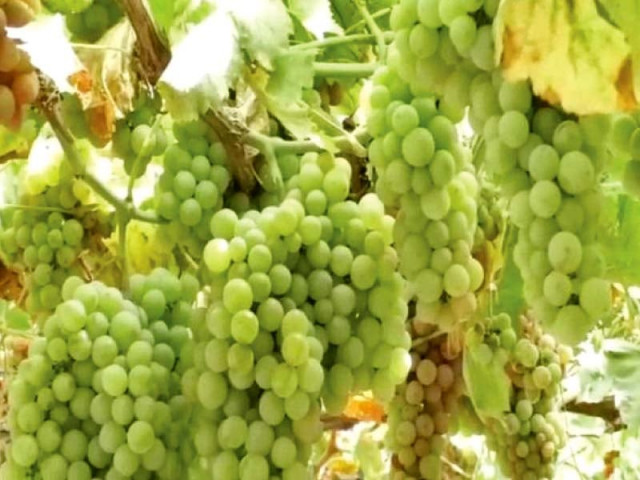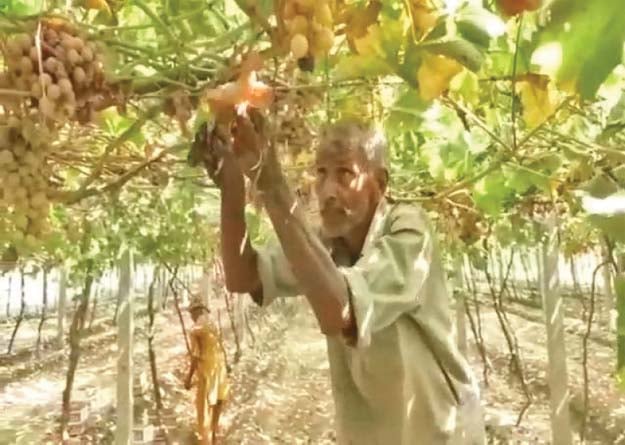Grape cultivation gains momentum in Sheikhupura
Farming brings millions of rupees from just one acre of land due to good crop turnover, say farmers

Just a few years ago, the prospect of cultivating grapes in northern parts of Punjab was unimaginable. PHOTOS: EXPRESS
Farmers in Sheikhupura said that growing local grapes is a profitable business where one can earn millions of rupees from just one acre of land due to a good crop turnover. They owe it to the taste, which allows local gardeners to make decent returns on the crop. The Sheikhupura Agriculture Department has imported many types of grape seeds from overseas and gave it to landlords who are interested in gardening. The department also guided them so that maximum production can be achieved in the province.
Sheikhupura Agriculture Department Assistant Director Arif Siddiqui said that the production of grapes in warmer areas has paid off thanks to the efforts of the research wing of the agriculture department. He added that the plant of grape starts bearing fruit three years after planting and it continues to do so for around 50 years. “It is amazing that one plant produces grapes for 50 years. This proves that it is profitable for business.”

A landlord from Sheikhupura named Allah Data, who takes interest in gardening, planted grape saplings on around 12 acres of land. He also hired employees for taking care of the plants. He said, “Despite the high cost of planting, I am expecting good rewards for my efforts.”
Pakistan’s grapes are cultivated on a 15,302 hectare area, where annual productivity is 64,317 tonnes. Balochistan grows most of the grapes. However, with the efforts of local agriculture institutes, the province grew grapes at a larger scale last year in the warmer areas of Multan, Bahawalpur and Rahim Yar Khan. Grapes were then grown in Sheikhupura this year.
Just a few years ago, the prospect of cultivating grapes in northern parts of Punjab was unimaginable, but environmental changes were made after the World Bank and the provincial government joined hands to improve farming standards and usher in new farming technologies.
The Punjab Irrigated Agriculture Improvement Programme selected a few lucky farmers who became part of the first phase of implementation of grape farming in the province. The initiative was funded by the World Bank with a loan of $250 million.
The provincial government then offered 60% subsidy to farmers for introducing new techniques. In order to qualify, the farmer had to contribute 40% to the cost, which alone made most farmers ineligible due to very high equipment charges upfront.
However, the programme was meant to offer an opportunity to small farmers to adopt modern technologies to cope with the growing water crisis, besides increasing agriculture yield. Grape cultivation through drip irrigation benefits the farmer, as well as the country, as the technique saves about 50% of water and about 45% of fertiliser costs. There is also a near 100% increase in per acre yield.
This year, the agriculture department has initially introduced five types of grapes including King Ruby, Sugarone, Flame Seedless, Vitro Black and Thompson Seedless and the experiment of cultivating these five types of seed in the region has been successful so far. The department provided complete guidance to the farmers.
Sheikhupura Khadija Polyclinic CEO and Physician Dr Tariq said that a substance called resveratrol found in grapes is an extremely powerful anti-oxidant. He added that resveratrol also has anti-cancer properties and is very healthy for the glands and large intestine. “It is also beneficial to combat heart diseases, diseases of the nervous system, Alzheimer’s disease, viral infections and fungal infections. Resveratrol reduces the risk of paralysis by improving the molecular mechanism in the veins.”
Published in The Express Tribune, July 16th, 2019.


















COMMENTS
Comments are moderated and generally will be posted if they are on-topic and not abusive.
For more information, please see our Comments FAQ